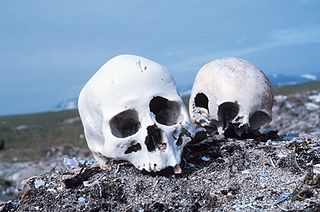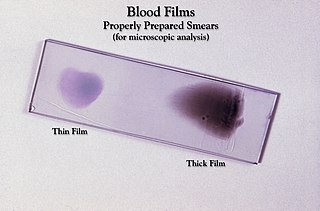
Anatomical pathology (Commonwealth) or Anatomic pathology (U.S.) is a medical specialty that is concerned with the diagnosis of disease based on the macroscopic, microscopic, biochemical, immunologic and molecular examination of organs and tissues. Over the last century, surgical pathology has evolved tremendously: from historical examination of whole bodies (autopsy) to a more modernized practice, centered on the diagnosis and prognosis of cancer to guide treatment decision-making in oncology. Its modern founder was the Italian scientist Giovan Battista Morgagni from Forlì.

Forensic pathology is pathology that focuses on determining the cause of death by examining a corpse. A post mortem is performed by a medical examiner, usually during the investigation of criminal law cases and civil law cases in some jurisdictions. Coroners and medical examiners are also frequently asked to confirm the identity of a corpse. Also see forensic medicine.
Hemoglobinopathy or Hemoglobinopathies is the medical term for a group of blood disorders and diseases that affect red blood cells.
Pathophysiology – a convergence of pathology with physiology – is the study of the disordered physiological processes that cause, result from, or are otherwise associated with a disease or injury. Pathology is the medical discipline that describes conditions typically observed during a disease state, whereas physiology is the biological discipline that describes processes or mechanisms operating within an organism. Pathology describes the abnormal or undesired condition, whereas pathophysiology seeks to explain the functional changes that are occurring within an individual due to a disease or pathologic state.
Dermatopathology is a joint subspecialty of dermatology and pathology or surgical pathology that focuses on the study of cutaneous diseases at a microscopic and molecular level. It also encompasses analyses of the potential causes of skin diseases at a basic level. Dermatopathologists work in close association with clinical dermatologists, with many possessing further clinical training in dermatology.

Paul Clemens von Baumgarten was a German pathologist.

Macroglossia is the medical term for an unusually large tongue. Severe enlargement of the tongue can cause cosmetic and functional difficulties in speaking, eating, swallowing and sleeping. Macroglossia is uncommon, and usually occurs in children. There are many causes. Treatment depends upon the exact cause.
Oral medicine is a specialty focused on the mouth and nearby structures. It lies at the interface between medicine and dentistry.

Theodor Hermann Meynert was a German-Austrian psychiatrist, neuropathologist and anatomist born in Dresden. Meynert believed that disturbances in brain development could be a predisposition for psychiatric illness and that certain psychoses are reversible.

The Indiana Medical History Museum is an Indianapolis monument to the beginning of psychiatric medical research. It is located on the grounds of what was formerly Central Indiana Hospital for the Insane, later shortened to Central State Hospital. It was placed on the National Register of Historic Places on April 25, 1972, as the Old Pathology Building.
The Armed Forces Institute of Pathology (AFIP) was a U.S. government institution concerned with diagnostic consultation, education, and research in the medical specialty of pathology.
Molecular pathology is an emerging discipline within pathology which is focused in the study and diagnosis of disease through the examination of molecules within organs, tissues or bodily fluids. Molecular pathology shares some aspects of practice with both anatomic pathology and clinical pathology, molecular biology, biochemistry, proteomics and genetics, and is sometimes considered a "crossover" discipline. It is multi-disciplinary in nature and focuses mainly on the sub-microscopic aspects of disease. A key consideration is that more accurate diagnosis is possible when the diagnosis is based on both the morphologic changes in tissues and on molecular testing.

Veterinary pathologists are doctors of veterinary medicine who specialize in the diagnosis of diseases through the examination of animal tissue and body fluids. Like medical pathology, veterinary pathology is divided into two branches, anatomical pathology and clinical pathology. Other than the diagnosis of disease in food-producing animals, companion animals, zoo animals and wildlife, veterinary pathologists also have an important role in drug discovery and safety as well as scientific research.

A medical laboratory or clinical laboratory is a laboratory where clinical pathology tests are carried out on clinical specimens to obtain information about the health of a patient to aid in diagnosis, treatment, and prevention of disease. Clinical Medical laboratories are an example of applied science, as opposed to research laboratories that focus on basic science, such as found in some academic institutions.
Oral and maxillofacial pathology refers to the diseases of the mouth, jaws and related structures such as salivary glands, temporomandibular joints, facial muscles and perioral skin. The mouth is an important organ with many different functions. It is also prone to a variety of medical and dental disorders.
The history of pathology can be traced to the earliest application of the scientific method to the field of medicine, a development which occurred in the Middle East during the Islamic Golden Age and in Western Europe during the Italian Renaissance.

A neurological disorder is any disorder of the nervous system. Structural, biochemical or electrical abnormalities in the brain, spinal cord or other nerves can result in a range of symptoms. Examples of symptoms include paralysis, muscle weakness, poor coordination, loss of sensation, seizures, confusion, pain and altered levels of consciousness. There are many recognized neurological disorders, some relatively common, but many rare. They may be assessed by neurological examination, and studied and treated within the specialities of neurology and clinical neuropsychology.

Elaine Sarkin Jaffe is a senior National Cancer Institute (NCI) investigator at the National Institutes of Health (NIH) most well known for her contribution to hematopathology. She completed her medical education at Cornell University and the University of Pennsylvania, receiving her M.D. degree from University of Pennsylvania in 1969. After an internship at Georgetown University she joined NCI as a resident in anatomic pathology, and has been a senior investigator since 1974, focusing on the classification and definition of lymphomas. Jaffe's early work helped to provide a deeper understanding of the origin of lymphomas, especially follicular lymphoma. Her team notably elucidated the difference between T cell and B cell lymphomas.













